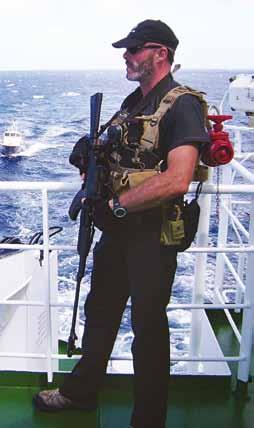
3 minute read
Gallice • Gilles Sacaze
CEO of Gallice Backed by the Holding Group Centaure, Gallice Security was set up in 2007. With an annual collective turnover of 36 million euros, both are eminent French enterprises in the global security market. Gallice Security was the first private French security company to enter Iraq, winning a contract in 2010 to protect the country’s public institutions, and is today the only one to have a lasting presence in this budding market.
Advertisement
What are the specificities of the French defense and security services enterprises in the global security market?
What we represent and advocate is a singularly French approach. Without caricaturizing the AngloSaxon model, we offer a better approach defined by interculturalism. Especially since we are the only French company to have developed something lasting beyond the provision of ad-hoc services in Iraq. Obviously, we faced competition from our Anglo-Saxon peers, who have been present there for a longer time and have already recovered their investments. We therefore entered the competition purposely with a “French touch”. We may have had to prove our way of working in the beginning, but today we are even working for American companies there. Our competitors worked in a deteriorating environment, probably at a time when there was no other option than to do what they were doing, that is to say being high-profile, extremely visible and forceful. At this juncture, they did not have a choice. Today, we believe the technique needs to change. We need to adopt an intercultural approach and keep a low profile, meaning we need to have externally unidentifiable convoys which offer no visible distinction between the West and the rich local businessman. We are working with Iraqis, with Sunnis in Sunni areas, with Shias in Shiite zones, with Kurds in Kurdistan. We therefore sincerely advocate interculturalism, and, in Iraq, it makes all the sense to do so.
What are the main obstacles for French defense and security service providers?
The first obstacle often comes from within our institutions. Our embassies, for example, often lack culture and information about the jobs and the actual strategic issues in question. We are often confronted with a dogmatic attitude that is against the security market, considered as a mainstream government function. The French Enterprises Club for Security Abroad (CEFSI), created last year and to which we are party, forms part of the response. We need to become more professional, guarantee transparency, and most of the actors in the field are serious people who are in favour of this transformation. CEFSI is only a first step forward but now we need to be able to remove these roadblocks that have become more pressing in the context of the current economic crisis.
What is the potential for the private security market in the global arena?
The market is in a state of growth, in all sectors and in several geographic locations where we are present. This is true whether talking of intellectual or operational activities, for both institutional customers as well as private clients. The main hindrance today is institutional and legal. I would say that the weakest sector of activity for Gallice is still growing at 10% per year. Other sectors are seeing a growth of 30%. This means we can claim a double-digit growth in all sectors. It is a highly promising market but we regret the fact that we are not better followed, particularly by banks. This is unfortunately the situation at large for French SMEs. The activity continues to scare people: we return once again to the cultural block. Bankers find the business very promising once having taken our statistics into account, yet they are not reassured and remain concerned about the nature of the activity, etc.








